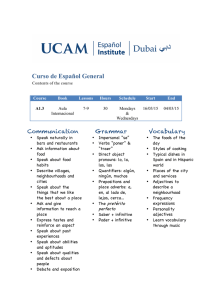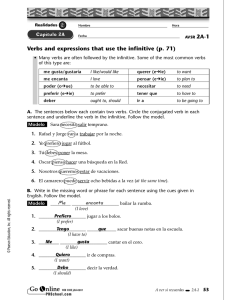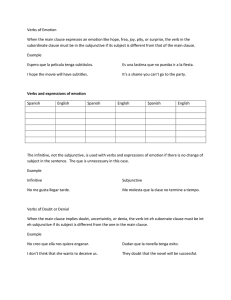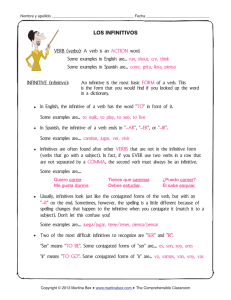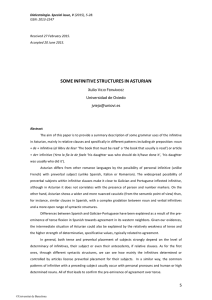Verbal periphrasis
Anuncio
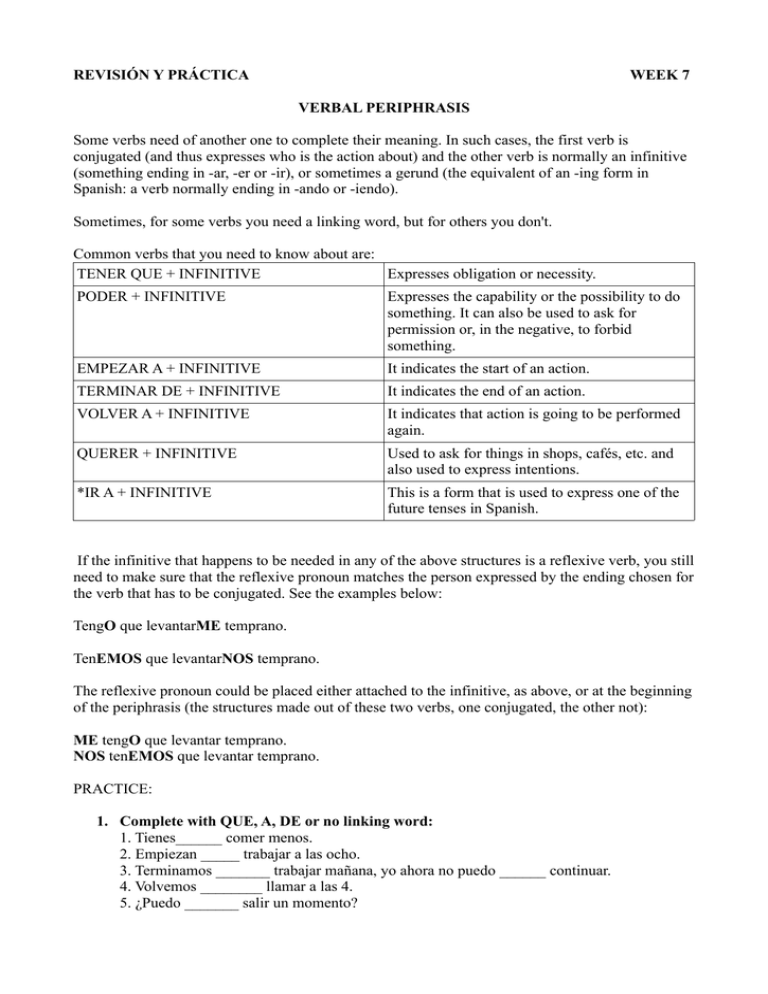
REVISIÓN Y PRÁCTICA WEEK 7 VERBAL PERIPHRASIS Some verbs need of another one to complete their meaning. In such cases, the first verb is conjugated (and thus expresses who is the action about) and the other verb is normally an infinitive (something ending in -ar, -er or -ir), or sometimes a gerund (the equivalent of an -ing form in Spanish: a verb normally ending in -ando or -iendo). Sometimes, for some verbs you need a linking word, but for others you don't. Common verbs that you need to know about are: TENER QUE + INFINITIVE Expresses obligation or necessity. PODER + INFINITIVE Expresses the capability or the possibility to do something. It can also be used to ask for permission or, in the negative, to forbid something. EMPEZAR A + INFINITIVE It indicates the start of an action. TERMINAR DE + INFINITIVE It indicates the end of an action. VOLVER A + INFINITIVE It indicates that action is going to be performed again. QUERER + INFINITIVE Used to ask for things in shops, cafés, etc. and also used to express intentions. *IR A + INFINITIVE This is a form that is used to express one of the future tenses in Spanish. If the infinitive that happens to be needed in any of the above structures is a reflexive verb, you still need to make sure that the reflexive pronoun matches the person expressed by the ending chosen for the verb that has to be conjugated. See the examples below: TengO que levantarME temprano. TenEMOS que levantarNOS temprano. The reflexive pronoun could be placed either attached to the infinitive, as above, or at the beginning of the periphrasis (the structures made out of these two verbs, one conjugated, the other not): ME tengO que levantar temprano. NOS tenEMOS que levantar temprano. PRACTICE: 1. Complete with QUE, A, DE or no linking word: 1. Tienes______ comer menos. 2. Empiezan _____ trabajar a las ocho. 3. Terminamos _______ trabajar mañana, yo ahora no puedo ______ continuar. 4. Volvemos ________ llamar a las 4. 5. ¿Puedo _______ salir un momento? 2. Complete the following dialogues: 1. -¿Vienes al cine esta tarde? -No, no __________ ir, _________ que estudiar. 2. -Lo siento, no ___________ (nosotros) esperar, (nosotros) __________ a comer ya, es que tengo prisa. -Tranquilo, hombre, no pasa nada. 3. ¿A qué hora ___________ de ensayar con la orquesta? - A las nueve. 4. Mañana _______ a levantarme a las seis en punto. ¿Y vosotros? -Nosotros no _________ levantarnos tan pronto. 3. Use the following reflexive verbs to complete the following sentences: Levantarse, ducharse, vestirse, lavarse los dientes, acostarse. 1. No quiero ________________ los dientes. 2. Puedo terminar de _______________ en un minuto, solo necesito una chaqueta y los zapatos. 3. Tenéis que ____________ antes de medianoche. 4. No puede _____________ porque no hay agua. 5. ¿Volvéis a ____________ pronto mañana? ANSWERS AT THE BOTTOM OF THIS PAGE 1. que a de, no linking word a no linking word 2. puedo, tengo podemos, vamos vuelves voy, queremos/ podemos 3. lavarme vestirme acostaros ducharse levantaros


